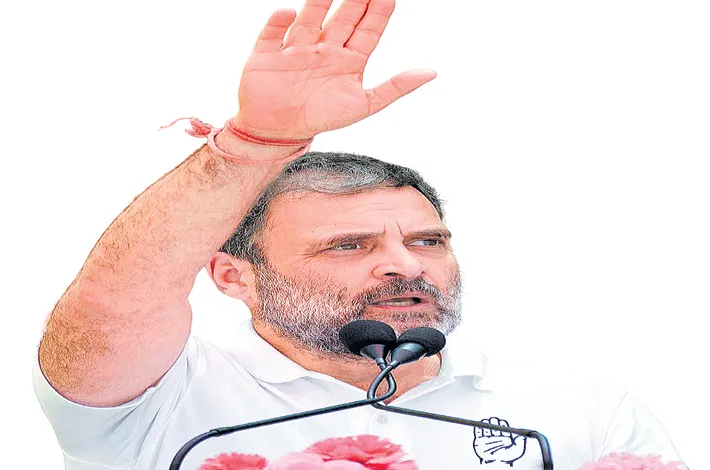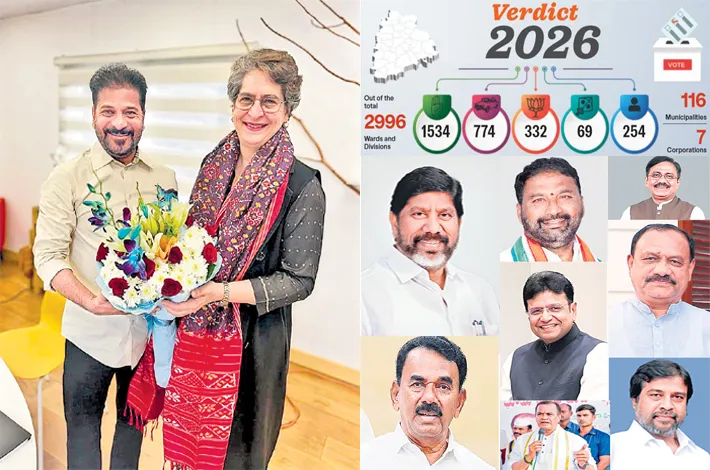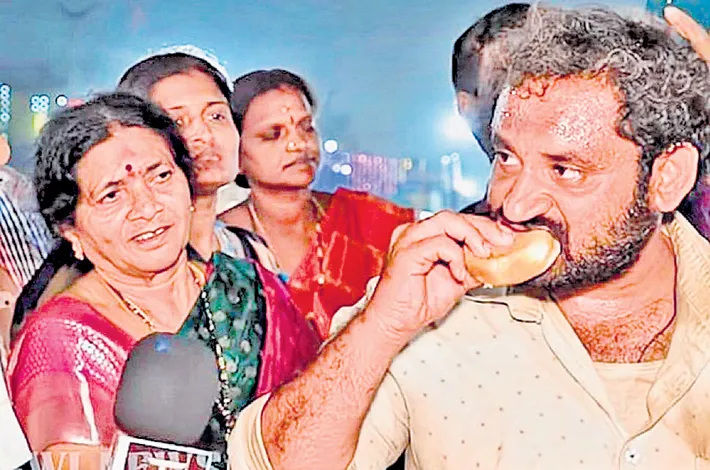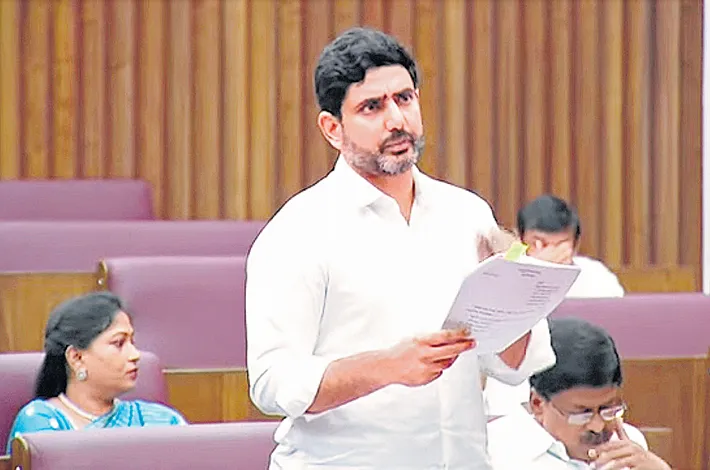Rahul Gandhi’s 2016 GST prophecy comes true!
17-08-2025 12:00:00 AM

Modi Govt Adopts 18% Cap in 2025
As the GST Council begins its deliberations today I want to stress again that an 18% cap on the GST rate is in everybody’s interest.
Rahul Gandhi had tweeted on October 18, 2016
■ Demonetisation: Predicted its devastating impact on the economy and small businesses. It halved India’s GDP growth.
■ Anti-Farm Laws: Opposed anti-farmer laws and said the govt will have to repeal them - they were withdrawn.
■ Land Acquisition Law: Advocated for fair reforms and remuneration to protect farmers. Govt had to leave it to the states even-tually.
■ COVID-19 Pandemic: Fore-warned about the severity comparing it to a ‘tsunami’ that was coming and asked the govt to be prepared. Indians paid a big price for misgovernance.
■ Economic Turmoil: Highlighted growing economic distress, high levels of unemployment, wide economic disparity.
■ Adani Scam: Has consistently raised Adani’s crony capitalism and financial irregularities and the political patronage offered by Modi
■ Trump Tariff: Has warned of adverse effects of U.S. trade tariff consistently.
■ Caste Census: Pushed for social justice through equitable representation - the govt finally has to agree to it.
■ Vote Chori: Has given proof of manipu-lation in voter lists that risk free and fair elections and threaten ‘One Man-One Vote’.
■ 18% GST Cap: Advocated for a balanced taxation system and always said there should be a cap
■ 18% on GST: govt likely to do the same 8 years after rolling out GST
VJM DIVAKAR I hyderabad
In a striking turn of events, Congress leader Rahul Gandhi’s decade-old prediction on the Goods and Services Tax (GST) has come to fruition, as the Narendra Modi-led National Democratic Alliance (NDA) government moves to implement an 18% cap on GST rates, aligning with Gandhi’s 2016 stance. On October 18, 2016, as the GST Council began its deliberations, Gandhi tweeted, “As the GST Council begins its deliberations today I want to stress again that an 18% cap on the GST rate is in everybody’s interest.”
Nine years later, this foresight is being hailed by supporters as a testament to his visionary leadership, while critics of the Bharatiya Janata Party (BJP) argue it exposes the ruling party’s delayed acknowledgment of pragmatic economic policies. This development caps a decade where Gandhi’s warnings on multiple issues—demonetisation, China’s aggression, Adani’s influence, India’s foreign policy, and more—have proven prescient, leaving the BJP to face accusations of dismissing his insights only to later adopt them.
The GST, introduced on July 1, 2017, under the stewardship of then-Finance Minister Arun Jaitley, was heralded by the Modi government as a landmark reform to unify India’s fragmented tax system. However, its implementation, marked by a complex five-slab tax structure (0%, 5%, 12%, 18%, and 28%), drew sharp criticism for burdening small businesses and consumers while allegedly favoring large corporations.
Gandhi, then a vocal opposition leader, consistently argued that a simpler GST with an 18% cap would balance economic growth with fairness, protecting micro, small, and medium enterprises (MSMEs) and ordinary citizens from excessive tax burdens. Posts on X from August 2025 reflect this sentiment, with users like
@Sanjvats stating, “2016: Rahul Gandhi warns about GST above 18% will hurt India. 2025: Govt accepts 18% cap. The difference between a politician and a visionary.” Prime Minister Modi announced “next-gen GST reforms” to be rolled out by Diwali, reducing tax slabs to just two rates: 5% and 18%. This move, described as a simplification of the GST regime, comes after years of debate over its complexity, with over 900 amendments to the tax structure since its inception.
Critics, including Gandhi, have long pointed out that the multi-slab system, combined with bureaucratic red tape and a glitch-prone GST portal, has crushed MSMEs, with over 18 lakh enterprises reportedly shutting down since 2017. Gandhi’s July 1, 2025, post on X called the GST a “brutal tool of economic injustice and corporate cronyism,” alleging it was designed to “punish the poor, crush MSMEs, undermine states, and benefit a few billionaire friends of the Prime Minister.”
This is not the first time Gandhi’s warnings have been vindicated. His critique of the 2016 demonetisation policy, which he labeled a “disaster” for small businesses and the informal economy, gained traction when economic data later revealed a significant slowdown in GDP growth and job losses. Similarly, his early concerns about China’s aggression along the Line of Actual Control (LAC) in 2020 were initially dismissed by the BJP as fear-mongering.
However, subsequent clashes in Galwan Valley and India’s increased military deployment validated his calls for stronger border preparedness. Karnataka Chief Minister Siddaramaiah echoed this in an August 7, 2025, post on X, stating, “Be it GST, demonetisation, Chinese aggression, the Modani nexus, or COVID failures… Shri Rahul Gandhi called them out early. The BJP mocked him. But he was proven right, again and again.”
Gandhi’s warnings about the growing influence of industrialists like Gautam Adani also gained prominence as allegations of monopolistic practices surfaced. His criticism of electoral bonds, farm laws, and the handling of COVID-19 further underscored his ability to identify policy flaws early. For instance, the Supreme Court’s 2024 ruling against electoral bonds aligned with Gandhi’s claims of opacity in political funding. Likewise, the repeal of the farm laws in 2021 followed widespread protests, which Gandhi had supported, warning of their adverse impact on farmers.
The BJP, however, has dismissed these claims as political opportunism. Union Minister Dharmendra Pradhan, on July 25, accused Gandhi of engaging in “politics of falsehood,” arguing that the GST’s complexities were necessary to balance diverse state interests. The Modi government has also highlighted GST’s role in increasing tax collections, with revenues crossing ₹2 lakh crore monthly in 2025, and credits the reform for fostering cooperative federalism. Yet, Gandhi’s allegations of the GST being weaponized against non-BJP-ruled states—by delaying dues or imposing stricter compliance—have resonated with opposition-led states like Karnataka, where small traders protested GST notices on UPI transactions in July 2025.
The Congress party has seized on the 18% GST cap as a validation of its vision. During his Bharat Jodo Yatra in 2022, Gandhi promised to simplify the GST if Congress came to power, proposing a single-slab system to reduce compliance burdens. Speaking in Adoni, Andhra Pradesh, in 2024, he reiterated, “The Congress Party will rework the GST, making it simpler and less burdensome.” The 2025 reforms, while a step toward simplification, fall short of the single-slab system Gandhi advocated, prompting Congress to argue that the NDA is merely playing catch-up.
The political fallout has been significant. The BJP, once dismissive of Gandhi’s critiques, now faces accusations of belatedly adopting his suggestions while failing to acknowledge his foresight. Social media platforms are abuzz with memes and posts mocking the BJP’s initial sneers, with users like
@KibaVenisha








